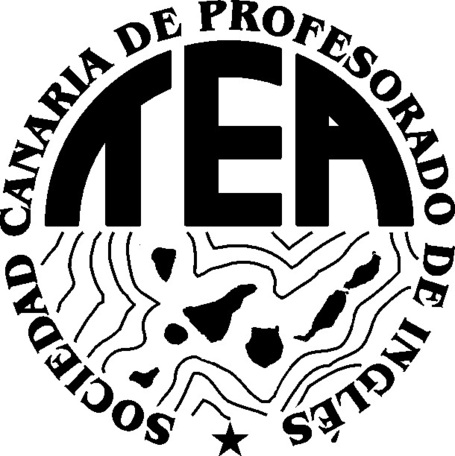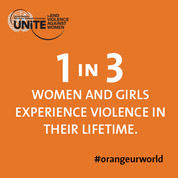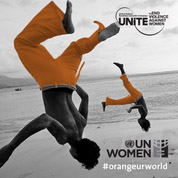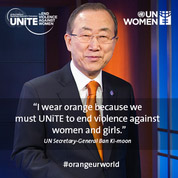miércoles, 18 de diciembre de 2013
miércoles, 11 de diciembre de 2013
Mandela says goodbye
domingo, 24 de noviembre de 2013
International Day for the Elimination of Violence Against Women
- In December 1999, the 54th session of
the United Nations General Assembly adopted Resolution 54/134 declaring
November 25th the International Day for the Elimination of Violence
Against Women. The origins of November 25th go back to 1960, when the
three Mirabal sisters from the Dominican Republic were violently
assassinated for their political activism. The sisters, known as the
"Unforgettable Butterflies", became a symbol of the crisis of violence
against women in Latin America. November 25th was the date chosen to
commemorate their lives and promote global recognition of gender
violence, and has been observed in Latin America since the 1980s.
Violence against women and girls is a problem of pandemic
proportions. According to UNIFEM, at least one in three women in the
world has suffered from violence, usually by someone known to her. In
many societies, bias in the legal system and community attitudes add to
the trauma. Source: UNIFEM
Selected learning materials
16 Days of Activism Against Gender Violence Campaign: Bibliography and Resource ListBibliography of resources which can be used in the annual 16 Days of Activism Against Gender Violence campaign (between 25 November, International Day to Eliminate Violence Against Women -- which marks the violent deaths of the three Mirabal sisters in the Dominican Republic in 1960 -- and 10 December, International Human Rights Day).
Child Trafficking and Sexual Exploitation
This module contains four lesson plans and each lesson is highly flexible and adaptable. Standards by the National Council for the Social Studies (NCSS) were used to guide the development of this module and it is designed so that teachers can teach a lesson within 1-2 class periods to introduce the subject or fully integrate the materials into the classrooms throughout the year. Teachers can also combine different lesson plans or combine modules for a more comprehensive introduction. Some suggestions are provided by the author. Child trafficking is an extremely sensitive subject as it addresses trafficking of children for sexual exploitation. The module may be more appropriate for high school levels.
The Annotated Guide to the Complete UN Trafficking Protocol
The Annotated Guide to the new United Nations Trafficking Protocol is intended to be of use to legal professionals in their work on developing a human rights framework for national anti-trafficking laws and policies.
Trafficking in persons (Asian Human Rights Commission)
The Handbook is intended for NGOs, activists and persons who come into contact with trafficked persons or who are interested in the issue of trafficking. This is a broad-based manual, containing general strategies that can be further adapted to local contexts. The Handbook was developed out of regional human rights training held for Asia and Eastern Europe, Africa and Latin America.
Handbook for legislation on violence against womenThis handbook provides policymakers and other stakeholders with guidance on creating and strengthening policies against violence against women.
Other education and training materials about violence against women in HREA's on-line Library
International and regional standards on ending gender-based violence:
- Convention on the Elimination of All Forms of Discrimination against Women (CEDAW) (1979)
- Inter-American Convention on the Prevention, Punishment and Eradication of Violence Against Women (1994)
- UN Declaration on the Elimination of Violence Against Women (1993)
- Beijing Platform for Action - Violence against Women (1995)
- UN Security Council resolution 1325 on Women, Peace and Security (2000)
- Optional Protocol to the International Convention on the Elimination of All Forms of Discrimination against Women (2000)
- Council of Europe Convention on preventing and combating violence against women and domestic violence (2011)
Useful Links
Say NO to Violence Against Women
Asian Task Force Against Domestic Violence
Violence Against Women Online Resources
White Ribbon Campaign (Men working to end men's violence against women)
Stop Rape Now (UN Action against sexual violence in conflicts)
UNiTE to End Violence Against Women (UN Secretary General's campaign)
Links to other organisations and initiatives on preventing violence against women
he Issue
Violence against women and girls is one of the most widespread violations of human rights. According to a 2013 WHO global study, 35 per cent of women worldwide have experienced either physical and/or sexual violence. However, some national studies show that up to 70 per cent of women have experienced physical and/or sexual violence in their lifetime from an intimate partner [1].To raise awareness and trigger action to end this global scourge, the UN observes International Day for the Elimination of Violence against Women on 25 November. The date marks the brutal assassination in 1960 of the three Mirabal sisters, political activists in the Dominican Republic.
Every year, 25 November and the ensuing 16 Days of Activism against Gender Violence which follow (ending on 10 December, Human Rights Day) are commemorated around the world, providing individuals and groups a chance to mobilize and call attention to the urgent need to end violence against women and girls.
Ending violence against women is one of UN Women’s key priority areas, with programmes addressing the pandemic implemented globally. UN Women also coordinates the UN Secretary-General’s UNiTE to End Violence against Women campaign and supports widespread social mobilization through its Say NO – UNiTE to End Violence against Women social media platforms on Facebook and Twitter. In addition, UN Women manages the UN Trust Fund to End Violence against Women which commemorates its 17th anniversary in 2013.
#orangeurworld
As part of this year’s theme “Orange the World in 16 Days”, we invite you to wear orange – the official colour of the UNiTE campaign. On Orange Day, now observed on the 25th of every month, worldwide activities by UN country offices and civil society organizations strive to highlight efforts to prevent and end violence against women and girls. This year, the UNITE Campaign is extending Orange Day throughout the 16 Days of Activism.
Participate by submitting a photo with a message “I wear orange because…”
- See more at: http://www.unwomen.org/en/news/in-focus/end-violence-against-women#sthash.1Hlp9qj2.dpuf
| International Day for the Elimination of Violence Against Women | ||
Violence against women and girls is a problem of pandemic proportions. According to UNIFEM, at least one in three women in the world has suffered from violence, usually by someone known to her. In many societies, bias in the legal system and community attitudes add to the trauma. Source: UNIFEM Selected learning materials 16 Days of Activism Against Gender Violence Campaign: Bibliography and Resource List Bibliography of resources which can be used in the annual 16 Days of Activism Against Gender Violence campaign (between 25 November, International Day to Eliminate Violence Against Women -- which marks the violent deaths of the three Mirabal sisters in the Dominican Republic in 1960 -- and 10 December, International Human Rights Day). Child Trafficking and Sexual Exploitation This module contains four lesson plans and each lesson is highly flexible and adaptable. Standards by the National Council for the Social Studies (NCSS) were used to guide the development of this module and it is designed so that teachers can teach a lesson within 1-2 class periods to introduce the subject or fully integrate the materials into the classrooms throughout the year. Teachers can also combine different lesson plans or combine modules for a more comprehensive introduction. Some suggestions are provided by the author. Child trafficking is an extremely sensitive subject as it addresses trafficking of children for sexual exploitation. The module may be more appropriate for high school levels. The Annotated Guide to the Complete UN Trafficking Protocol The Annotated Guide to the new United Nations Trafficking Protocol is intended to be of use to legal professionals in their work on developing a human rights framework for national anti-trafficking laws and policies. Trafficking in persons (Asian Human Rights Commission) The Handbook is intended for NGOs, activists and persons who come into contact with trafficked persons or who are interested in the issue of trafficking. This is a broad-based manual, containing general strategies that can be further adapted to local contexts. The Handbook was developed out of regional human rights training held for Asia and Eastern Europe, Africa and Latin America. Handbook for legislation on violence against womenThis handbook provides policymakers and other stakeholders with guidance on creating and strengthening policies against violence against women. Other education and training materials about violence against women in HREA's on-line Library International and regional standards on ending gender-based violence: - Convention on the Elimination of All Forms of Discrimination against Women (CEDAW) (1979) - Inter-American Convention on the Prevention, Punishment and Eradication of Violence Against Women (1994) - UN Declaration on the Elimination of Violence Against Women (1993) - Beijing Platform for Action - Violence against Women (1995) - UN Security Council resolution 1325 on Women, Peace and Security (2000) - Optional Protocol to the International Convention on the Elimination of All Forms of Discrimination against Women (2000) - Council of Europe Convention on preventing and combating violence against women and domestic violence (2011) Useful Links Say NO to Violence Against Women Asian Task Force Against Domestic Violence Violence Against Women Online Resources White Ribbon Campaign (Men working to end men's violence against women) Stop Rape Now (UN Action against sexual violence in conflicts) UNiTE to End Violence Against Women (UN Secretary General's campaign) Links to other organisations and initiatives on preventing violence against women |
Intercambio de conversación en lanzarote. Dale a la lengua!!!!

Intercambio Idiomas / Free Spanish/ English Language Exchange. From
September the Lanzarote Business and Residents Association will be
resuming their free intercambio / free language exchange sessions. They
will be meeting every week at the following venues;
Monday: Picnic Cafe/Bistro Bar, Puerto del Carmen. Time: 5.30pm
Tuesday: Terraza Zen, Club de Golf, Costa Teguise. Time: 6.00pm
Wednesday: Oasi Chill Bar, Playa Honda. Time: 11.30am and 5.30pm
Thursday: La Bocaina Terrace Bar, Playa Blanca. Time: 11.30am
In addition commencing October 5th, on the first Saturday of each
month, L.I.L.S. Lanzarote´s International Language School in Puerto del
Carmen will be hosting free intercambio sessions between 10.30 and 12.00
It’s a great way to improve your Spanish / English speaking skills in
relaxed and friendly environments. Just come along buy a drink and join
in the conversation, all levels welcome, however some knowledge is
necessary as these are conversational sessions not teaching classes.
For further details please contact the LBA email lanzaroteba@gmail.comTel: 928 596 080 / 638 240 224
jueves, 21 de noviembre de 2013
DÍA DEL ENSEÑANTE 2013 - SÁBADO 30 DE NOVIEMBRE en Lanzarote.
Como cada año celebraremos el DÍA DEL ENSEÑANTE, este año será el
SÁBADO 30 DE NOVIEMBRE.
SÁBADO 30 DE NOVIEMBRE.
Se trata de dos actividades, la primera consiste en
un Sendero interpretado por el corazón
de la Geria y degustación de Vinos en Bodegas de la Zona y la segunda en
un encuentro social asadero en el Merendero
de Mancha Blanca.
Aunque se celebre el día del enseñante podemos
acudir con amigos, parejas, niños, etc.
Las personas interesadas en asistir a alguna de las
actividades, o a ambas, se pondrán en contacto con el CEP de Lanzarote para confirmar y poder
organizar dichas actividades.
Límite de inscripción: Jueves 28 de Noviembre. TLF.
928801313-815290.
DESCRIPCIÓN MÁS DETALLADA DE LAS ACTIVIDADES:
·
Ruta
interpretada por la Geria con visita a bodegas y degustación de vino.
Nivel de dificultad: Bajo.
Duración: 2 horas y 30 min. Aprox.
Hora de salida 10:00.
Precio 15 euros- niños gratis.
Punto de encuentro: Ermita de la Caridad en la carretera de la Geria. Entre la bodega de la Geria y bodegas Rubicón.
·
Encuentro
social- asadero en el merendero de Mancha Blanca
Hora: 14:00.
Precio: 12 euros- niños gratis
miércoles, 20 de noviembre de 2013
Programación didáctica segun el modelo PROIDEAC.
Te invitamos a que visualices esta Prezi que te irá presentando el modelo de Programación didáctica.
martes, 19 de noviembre de 2013
CONVOCATORIA DE LA DGOIPE. CLIL SECUNDARIA
Mañana miércoles y el próximo miércoles 27 de noviembre, continúan las sesiones de trabajo y seguimiento del programa CLIL. En esta ocasión en Secundaria. El 20 de noviembre de 12 a 14 horas está convocado el profesorado de inglés y el próximo miércoles el profesorado de las distintas áreas.
El orden del día será el siguiente:
Información sobre
plataforma Moodle (novedades).
CLIL Job
Shadow.
Thinking Tips.
Programación CLIL.
Situación de
Aprendizaje (modelo ProIDEAC) y CLIL Checkchart.
Información
sobre acciones de formación del programa CLIL

UN LONDINENSE EN EL IES LAS SALINAS
Así
nos relata la coordinadora CLIL del IES Las Salinas la visita a su
centro de un Londinense que se encuentra disfrutando de una beca
Leonardo da Vinci en Canarias.
On November 8th, we had the opportunity to receive Nick
Appel, a Londoner who studied Philosophy and he is now in Gran Canaria with a Leonardo
da Vinci grant.
We had planned some activities related to Maths,
Ethics, Biology and Music before the visit:
1º ESO: they compared the way we do long divisions
with the way English people do it. The main objective was to show our students
that different algorithms give the same answer to the same problems. The idea
is to open our students’ mind to other ways of thinking. And we took advantage
of Nick’s visit to do this.
As he was coming to the island as a tourist, the
students decided to give him some information about Lanzarote.
4th
ESO: they also talked about history, food, population, ways of living,
Philosophy, Ethics, legends, etc.
At the end of this activity they asked him some
questions about him, his hobbies, his daily routine, his studies, and so on.
They enjoyed the activity because it broke the daily
routine of the classes.
 |
| La profesora de inglés Loli, Nick y alumn@s |
 |
| El equipo CLIL , Nick y el director del centro: Santiago |
 |
| El profesor de matemáticas CLIL Jose y Nick. |
miércoles, 13 de noviembre de 2013
martes, 12 de noviembre de 2013
SESIÓN DE TRABAJO Y SEGUIMIENTO DEL PROGRAMA CLIL DE CENTROS DE EDUCACIÓN PRIMARIA.
Mañana miércoles a las 12 horas tendrá lugar en el CEP Lanzarote
una reunión del profesorado participante en el programa CLIL de primaria
de Lanzarote.
El orden del día será el siguiente:
Información sobre
plataforma Moodle (novedades).
CLIL Job
Shadow.
Thinking Tips.
Programación CLIL.
Situación de
Aprendizaje (modelo ProIDEAC) y CLIL Checkchart.
Información
sobre acciones de formación del programa CLIL.

martes, 5 de noviembre de 2013
GUY FAWKES' DAY - BONFIRE NIGHT
La Noche de Guy Fawkes (en inglés: Guy Fawkes Night, también conocida en inglés como Bonfire Night, (la noche de las hogueras), Cracker Night o Fireworks Night (la noche de los fuegos artificiales) es una celebración que se realiza principalmente en el Reino Unido la noche del 5 de noviembre, para conmemorar el fracaso del atentado del 5 de noviembre de 1605, conocido como la conspiración de la pólvora, con el que una facción de católicos, entre los que se encontraba Guy Fawkes, intentaron destruir el Palacio de Westminster, la sede del parlamento en Londres.

Te dejamos estos links con rescursos para el aula...
http://learnenglishteens.britishcouncil.org/uk-now/video-uk/bonfire-night
http://www.esolcourses.com/topics/bonfire-night.html
http://www.michellehenry.fr/bonfire.htm
http://www.eslprintables.com/Vocabulary_worksheets/Holidays_and_traditions/Bonfire_Night/
lunes, 21 de octubre de 2013
“TEA is 30! The reunion" Sociedad Canaria del Profesorado de Inglés TEA
Durante los días 14 y 15 de noviembre se celebrará en el CEP Las Palmas y el día 16 en la propia ciudad de Las Palmas de Gran Canaria las XXX Jornadas de la Sociedad Canaria de Profesorado de Inglés.

Las jornadas ofrecen a todos las personas socias y participantes un amplio abanico de presentaciones por ponentes de prestigio local, nacional e internacional en las que incluyen plenarias, talleres, presentaciones y una exquisita visita a los lugares británicos más emblemáticos de la ciudad de Las Palmas de Gran Canaria.También podrás conocer las últimas novedades editoriales
Asimismo, dentro del marco de las jornadas, se celebrará la reunión anual de las personas socias para, entre otras cosas, elegir la próxima Junta Directiva que mantendrá TEA viva otros dos años.
Anímate y reencuéntrate en las XXX Jornadas TEA.
La temática de las Jornadas 2013 “TEA is 30! The reunion"pone énfasis en el reencuentro anual de colegas y amigos en un marco formativo sin igual en Canarias.
Para más información pincha AQUÍ
jueves, 17 de octubre de 2013
FAREWELL COMENIUS, LEONARDO, GRUNDTVIG....!!!!
Desde el 1 de enero de 2014 tendremos un nuevo programa de educación, formación, juventud y deportes de la Unión Europea que se llamará Erasmus+.
Este abarcará el período de 2014 a 2020.
Unificará bajo un único el Programa de Aprendizaje Permanente (las acciones de los subprogramas Leonardo, Comenius, Grundtvig, Erasmus and Jean Monnet), Juventud en Acción y otros cinco programas internacionales, incluyendo Erasmus Mundus y Tempus.
Erasmus + se centrará en el aprendizaje formal e informal dentro las fronteras de la Unión Europea con el fin de mejorar las habilidades y empleabilidad de estudiantes, educadores y trabajadores. Compartimos una presentación Prezi donde nos explica el borrador de este nuevo reto europeo.
Erasmus se denomina así tras un programa de intercambio de estudiantes que tuvo muchísima ecpetación llamado EuRopean Community Action Scheme for the Mobility of University Students.
miércoles, 16 de octubre de 2013
THE BATTLE OF TRAFALGAR.
La próxima semana 21 de octubre se rememora un evento histórico "The Battle of Trafalgar" te hacemos llegar un link donde podrás acceder a una presentación donde podrás revivir este hecho histórico con tu alumnado y conocer su transcendencia histórica.Trafalgar Battle
 |
| Trafalgar Square. Foto: Wikipedia |
martes, 15 de octubre de 2013
Getting ready for Halloween!!!!
Compartimos hoy algunos links que pueden inspirarte para celebrar la festividad de Halloween en tu centro. ENJOY HALLOWEEN!!!!
http://www.anglomaniacy.pl/halloween.htm
http://bogglesworldesl.com/halloween_worksheets.htm
http://www.teachervision.fen.com/halloween/teacher-resources/6626.html
http://www.teachingenglish.org.uk/teaching-kids/halloween
http://www.123certificates.com/halloween.php

lunes, 14 de octubre de 2013
VOLVEMOS "A CASA"
El CEP de Lanzarote coordina una nueva visita del
profesorado de la isla a
“A CASA”, el museo del escritor José Saramago
Todo el profesorado interesado en visitar la Casa-Museo José Saramago y
descubrir el valor educativo de esta entidad para preparar una futura
visita con su alumnado, está citado, de forma gratuita, el próximo
sábado 26 de Octubre a las 11:00 en las instalaciones del museo en Tías. La visita dura 2 horas, aproximadamente. Para facilitar la organización, el CEP requiere a los interesados/as en asistir que remitan un correo electrónico para la confirmación de su asistencia a la siguiente dirección
sábado 26 de Octubre a las 11:00 en las instalaciones del museo en Tías. La visita dura 2 horas, aproximadamente. Para facilitar la organización, el CEP requiere a los interesados/as en asistir que remitan un correo electrónico para la confirmación de su asistencia a la siguiente dirección
cmorump@hotmail.com
indicando el nombre, apellido y centro de quienes vayan a acudir.
indicando el nombre, apellido y centro de quienes vayan a acudir.
 |
| Tomando un cafecito en " A CASA" |
El curso pasado varios centros educativos (IES César manrique, IES Las Salinas...) utilizaron dicho recurso para dinamizar el Programa CLIL, ¿Te animas?

lunes, 7 de octubre de 2013
VISITAS DE ESTUDIOS. PROGRAMAS EUROPEOS
Hasta el 15 de octubre está abierto el segundo plazo para solicitar participar en visitas de estudio. Este será el último plazo disponible en marco del Programa de Aprendizaje Permanente para participar en este programa, pues a partir de 2014, el nuevo programa será Erasmus +.
Una visita de estudios es un encuentro de un grupo de 10 y 15 especialistas y responsables en materia de educación y formación profesional, quienes se reúnen entre 3 y 5 días para debatir un aspecto determinado del aprendizaje permanente en otro país.
¿Quién puede participar?
Podrán hacerlo los especialistas y responsables de educación y formación profesional, es decir, cualquier persona experta en estos ámbitos. Estas podrían ser, por ejemplo, representantes de autoridades educativas locales, autonómicas y nacionales; miembros de los equipos directivos; directores de centros de orientación y evaluación; responsables de departamentos didácticos; personal formador del profesorado; inspectores, asesores y pedagogos; personal investigador; coordinadores y tutores de la acción Movilidad de Alumnado Comenius en los centros; coordinadores Erasmus en los centros; coordinadores de movilidad Leonardo da Vinci en los centros, entre otros.
Pincha en el link si estás interesad@:
http://studyvisits.cedefop.europa.eu/index.asp?cid=2&artid=6137&scid=74&artlang=ES
Suscribirse a:
Entradas (Atom)





